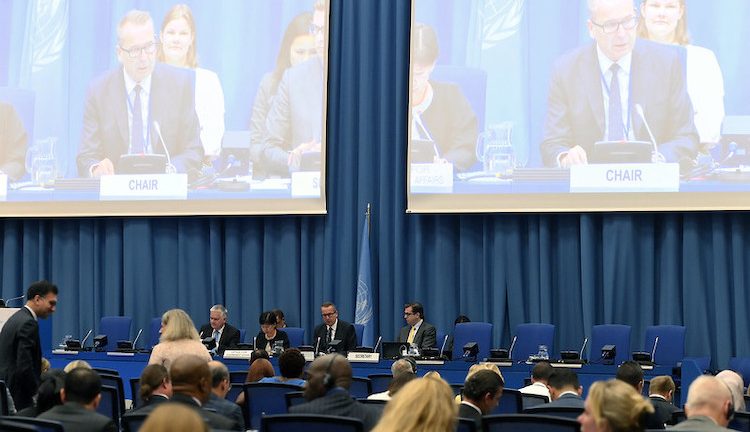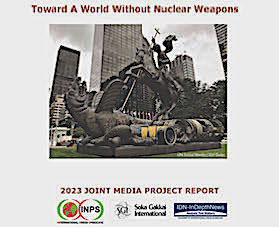Analysis by Sergio Duarte
The writer is an Ambassador, a former High Representative of the United Nations Office of Disarmament Affairs., and President of Pugwash Conferences on Science and World Affairs.
NEW YORK. 7 September 2023 (IDN) — The preparatory cycle for each Review Conference of the Treaty on the Non-Proliferation of Nuclear Weapons (NPT) was established at the Review and Extension Conference as one of the elements that made possible agreement on the indefinite extension of the Treaty. (P17) JAPANESE | KOREAN
It consists of three yearly Sessions of a Preparatory Committee in each of the three years prior to the Review Conferences and was supposed to allow for structured procedural and substantive discussions aimed at facilitating agreement at the following Review Conference.
Unfortunately, the results of the Review Conferences held since have been less than satisfactory: those in 2005, 2015 and 2022 were unable to reach consensus on a substantive Final Document, while most of the actual progress achieved by the 2000 and 2010 has been largely disavowed and practically forgotten.
The First Session of the 2023 Preparatory Committee for the XI Review Conference of the NPT concluded its proceedings last August in Vienna with another disappointing outcome that calls into question the authority and relevance of that important instrument.
Contrasting positions already seen at the previous Review Conference in 2022 reemerged with precipitating exchanges. The longstanding disagreement between nuclear and non-nuclear states on progress in nuclear disarmament remains the main point of contention, while new tensions directly involving nuclear-weapon states themselves have come to the fore.
The current preparatory cycle is taking place at a time of an ongoing war between Russia and Ukraine, with the involvement of NATO. This is the most dangerous crisis between the possessors of the largest nuclear arsenals since the Cuban missile confrontation in 1962 and carries the risk of actual use of nuclear weapons.
Other grave problems of the current international security panorama are the development of new and more deadly weapons by all nuclear states, the lack of meaningful communication between Moscow and Washington, the evolving security architecture of the Indo-Pacific region and the possibility of use of nuclear weapons in combat.
At the same time, the existing international instruments for the control and elimination of the other two categories of weapons of mass destruction also face difficult challenges. The recent Review Conference of the Convention on Bacteriological (Biological) Weapons (BWC) failed to adopt the substantive part of its Final Document. At the same time, the V Review Conference of the Chemical Weapons Convention (CWC) ended last May with similarly disquieting outcomes.
Finally, the United Nations Security Council is all but impotent to fulfil its role as the international organ primarily responsible for the maintenance of peace and security.
Concern with the proliferation of nuclear weapons
Concern with the proliferation of nuclear weapons started seventy-eight years ago with the first experimental detonation of an atomic explosive device in 1945. Six months later the General Assembly of the United Nations created a Commission charged with making proposals for the elimination of atomic weapons and all other weapons of mass destruction. The Commission was disbanded in 1948 without having achieved progress toward that end. Bacteriological and chemical weapons have been banned by international instruments but the threat of nuclear weapons continues to haunt mankind.
In 1965 General Assembly Resolution 2028 (XX) called for the negotiation at the Eighteen-nation Disarmament Committee (ENDC) of a treaty to prevent the proliferation of nuclear weapons, based on a set of five main agreed principles. According to the first two of those principles, the treaty should a) “be void of loopholes that might permit nuclear or non-nuclear Powers to proliferate, directly or indirectly, nuclear weapons in any form”, and b) should embody a mutually acceptable balance of responsibilities and obligations of the nuclear and non-nuclear powers”.
In spite of the lack of agreement at the end of the debates on a draft treaty at the Eighteen-nation Disarmament Committee in 1965-68, the NPT was adopted by the General Assembly in 1968 and is considered the cornerstone of the nuclear non-proliferation and disarmament architecture. Its central bargain promised early and effective steps toward nuclear disarmament in exchange for renunciation of the acquisition of nuclear weapons by those that do not possess them. The NPT also recognizes the inalienable right of all its parties to develop, research, produce and use nuclear energy for peaceful purposes in conformity with its Articles I and II.
Much of the nonconformity and disagreement that have plagued the ten Review Conferences held so far stem from the realization that many parties to the Treaty finally adopted did not faithfully follow those different yet carefully balanced obligations, both in letter and in spirit. Over time, the NPT in fact, consolidated two watertight categories of nations with different and grossly unbalanced rights and obligations.
For instance, elaborate and compulsory procedures have been put in place to verify the fulfillment of the commitments of non-nuclear parties, but no similar provisions apply to the nuclear ones. The perceived lack of political will on the part of the nuclear weapon states to even begin to fulfill their nuclear disarmament treaty obligations is seen as the main cause of the difficulties faced by the NPT review process. The nuclear weapon states do not deny their commitment to nuclear disarmament but have argued for decades that their nuclear weapons are vital to protect their security and that current security conditions do not permit the adoption of measures that would impose specific, legally binding and time-bound obligations to progressively reduce their arsenals to zero.
For its part, the wide majority of nations is convinced that nuclear disarmament would enhance the security of the international community as a whole, including the present nuclear states and their populations, and that the human and environmental risks associated with nuclear weapons far outweigh whatever positive features such arms are purported to have.
53 years after NPT entered into force
Fifty-three years after the entry into force of the NPT there remains considerable doubt on whether the Treaty has actually advanced the objective of eliminating nuclear weapons. It is true that their total numbers have been drastically reduced after having reached the staggering amount of 70,000 at the height of the Cold War, but these weapons today are speedily proliferating in numbers, stealth and destructive power. Their existence threatens mankind as a whole, since the effects of their use would not be confined to the belligerents. Human life on the planet could be extinguished as a result of a nuclear exchange.
The task of the first two sessions of the Preparatory Committee for NPT Review Conferences is to review principles and objectives, as well as specific issues with a view to promoting the full implementation and universality of the Treaty, while the third Session is required to formulate consensual recommendations to the Review Conference itself, both on substance and procedure, taking into account the results of the two preceding sessions.
The X Review Conference in 2022 established a Working Group on the further reinforcement of the review process of the Treaty. This group met prior to the First Session but was unable to agree on a report. Likewise, the first session of the PrepCom ended without adopting a substantive consensual report.
Dissension has always plagued preparations for NPT Review Conferences, but the positions taken by different countries and groups in recent occasions have been markedly less flexible than in previous instances.
With the objective of making effective and verifiable the commitment accepted by the nuclear weapon states under Actions 20 and 21 of the Action Plan agreed at the 2010 Review Conference, the Chair of the above-mentioned Working Group introduced, under his personal authority, a working paper containing 26 recommendations to the Preparatory Committee, including on the transparency of the national reports presented by the parties to the Treaty on their action toward nuclear disarmament.
Critical examination
A critical examination of such reports was suggested, as well as the adoption of a standard model to improve accountability on modernization plans, containing number, types and status (deployed or non-deployed) of nuclear warheads and their vectors; measures adopted to reduce the risk of accidental or involuntary use and the role of nuclear weapons in security policies and doctrines; measures adopted to reduce the operational alert of weapons systems; number and types of disassembled weapons and finally the quantities of fissionable material available for weapons purposes.
Subsequently, at the close of the work of the Preparatory Committee, its President introduced a Draft Factual Summary under his responsibility. However, there was opposition to even including it as a working document, forcing the President to convert it into a set of his own “recommendations”. The lack of constructiveness of the procedural discussion was unprecedented even by the dismal standards of past sessions of Preparatory Committees.
It is worth noting that for the first time, the risks and the humanitarian impact of nuclear deterrence were raised. The question of whether nuclear sharing is compatible with Article I of the NPT was brought up by some delegations in view of the Russian decision to deploy nuclear weapons in Belarus and of the presence of NATO nuclear weapons in some European countries. Some others proposed the gradual abandonment of nuclear power plants on account of their alleged dangers for populations and the environment.
Two other preparatory Sessions are scheduled for 2024 and 2025, before the XI Review Conference itself in 2026. The only positive conclusion to take from the session just ended is that all parties to the NPT seem to remain committed to its objectives, even if they disagree on their relative value. After the disappointing results of two NPT Review Conferences in a row, states party would do well to reexamine their attitudes and positions for the continuation of the current review cycle in order to permit a meaningful exchange that leads to the strengthening of the Treaty instead of perpetuating disagreement. There is a real risk that the current international structure of agreements on weapons of mass destruction become irrelevant or obsolete.
Despite the perceived shortcomings and differing views about its implementation, the NPT still commands the support of the overwhelming majority of the international community and is the only international instrument that legally commits its parties to the cessation of the nuclear arms race and to nuclear disarmament. The current disarray in the preparations for the forthcoming Review Conference is highly detrimental to its continued validity. It is urgent to prevent further deterioration of the Treaty’s authority and relevance. [IDN-InDepthNews]
Photo: The first session of the Preparatory Committee for the 2026 Review Conference of the Parties to the Treaty on the Non-Proliferation of Nuclear Weapons (NPT), which met from 31 July–11 August 2023 at the Vienna International Centre in Vienna, Austria. Credit: Dean Calma / IAEA
IDN is the flagship agency of the Non-profit International Press Syndicate.













